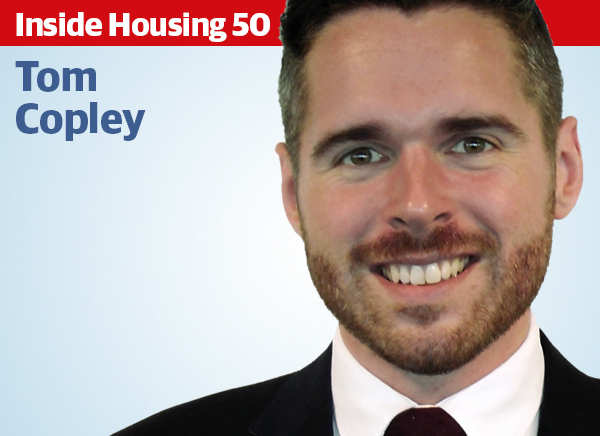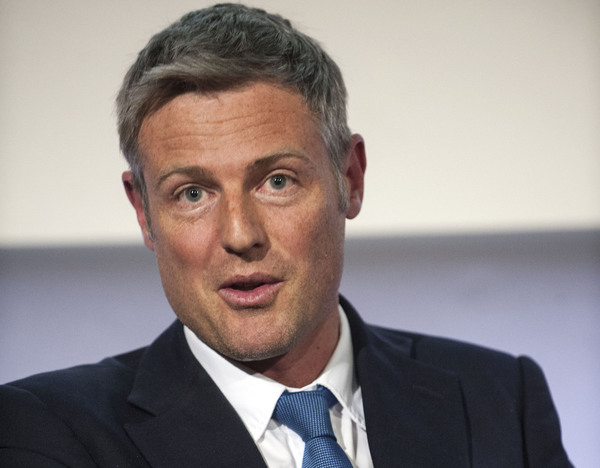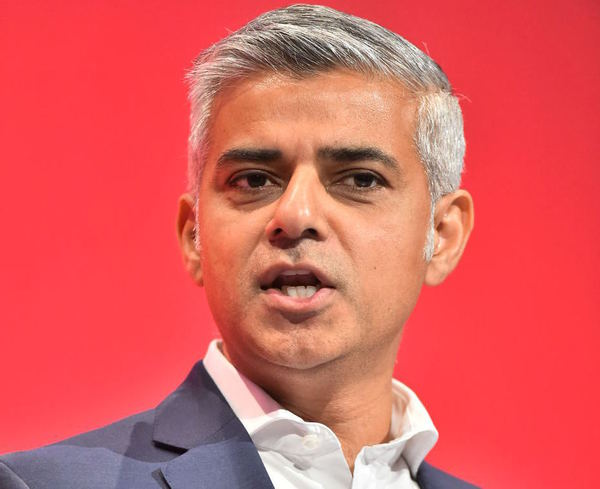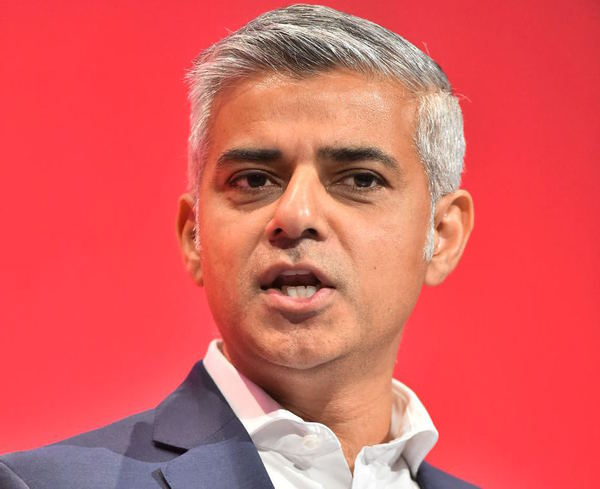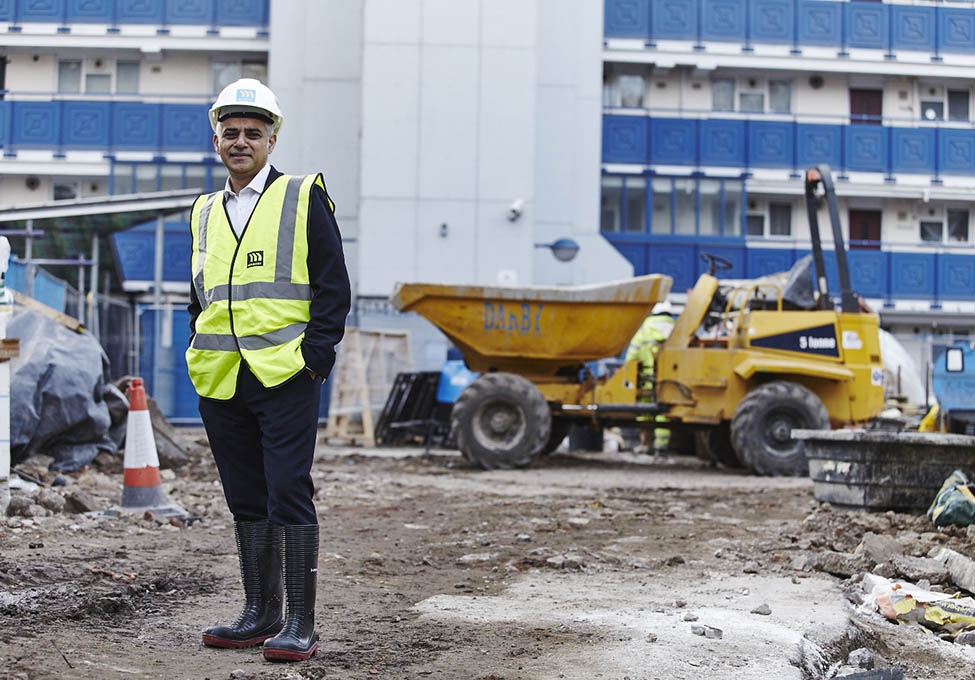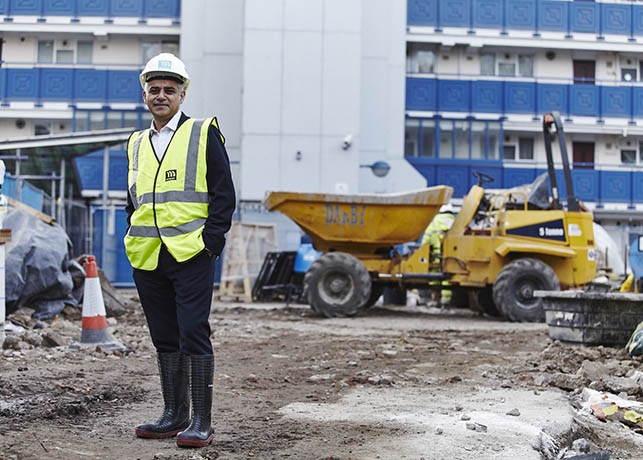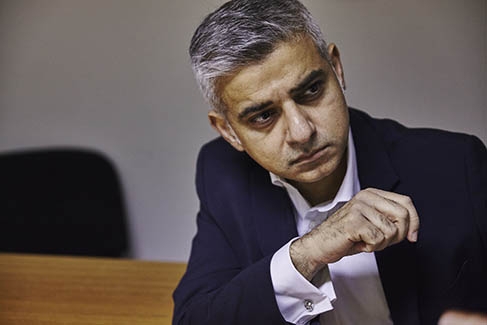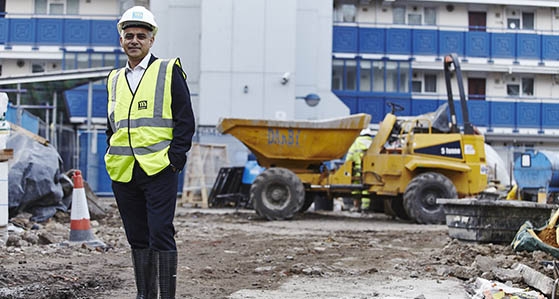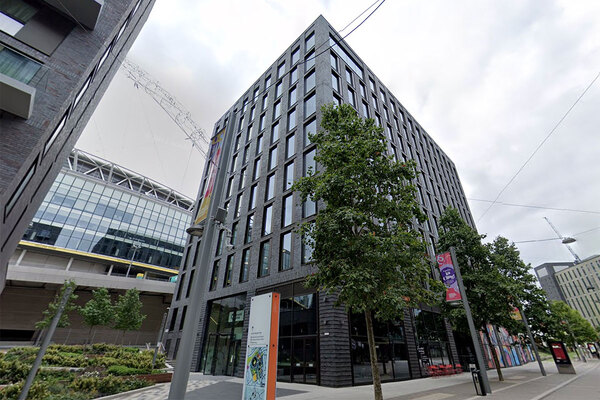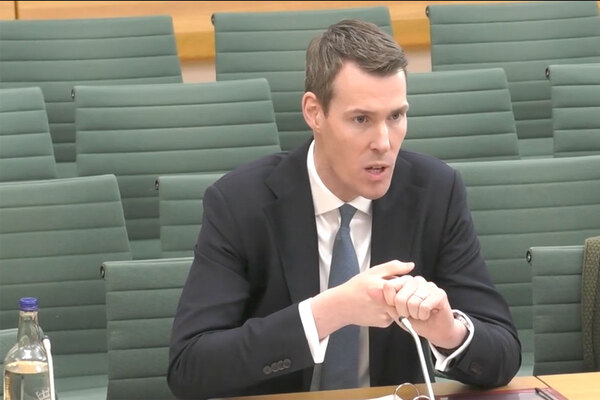The referendum man
Exclusive interview: Labour candidate Sadiq Khan has promised to turn the 2016 London mayoral election into a “referendum on housing”. Martin Hilditch finds out more
Video:
featuress

Source: Juan Trujillo Andrades
When Sadiq Khan launched his campaign to be London mayor earlier this year, he said the election would be a “referendum on housing”.
Today, on a building site on Islington’s Brunswick Estate, he’s sporting the go-to look for a politician who wants to be associated with new housebuilding – a smart blue suit, hard hat, high-vis jacket and wellington boots. It is textbook construction chic and in the preceding week, his Twitter timeline has shown him in a similar get-up on two other building sites.
As we trail in and out of the partially built homes and past the babble of hammering, drilling and revving dumper trucks, Mr Khan enthuses appropriately about the scheme as his entourage take pictures that are swiftly posted on social media. Despite his clear passion for his subject, he pokes gentle fun at the construction site visits, saying he spends large amounts of time talking to Londoners about their concerns “in between getting my photograph taken” and “speaking to builders”.
The Brunswick Estate has been carefully picked to demonstrate the kind of regeneration scheme he wants to see more of in the capital – involving better use of existing space. The scheme has seen the demolition of 40 garages and 10 bedsits, to be replaced by 13 new homes (increasing the number of affordable homes on site).
“The great thing is the people who will occupy the homes,” Mr Khan beams. “Local residents get first dibs.”
“I have got people who I love and adore who can’t afford to buy a property in London.”
Sadiq Khan
Labour’s mayoral hopeful is speaking to Inside Housing today to demonstrate his ongoing concern about the housing crisis and set out his proposed solutions - including a “Homes for Londoners” team of housing and regeneration experts in City Hall charged with addressing the issue. Inside Housing is here to find out what a Sadiq Khan mayoralty would mean for the sector - and his disposition towards housing associations given his public criticism of the voluntary deal they signed with government to extend the Right to Buy to their properties.
Video:
Ad slot
Mr Khan is at pains to point out that his interest in affordable housing is personal as well as political. He grew up in a council home - his dad was a bus driver, his mum “sewed clothes as well as raising a family at home”. The social rent enabled his parents to save and eventually buy their own property in Tooting, he states. Today his own family and friends are feeling the strain of soaring house prices and the shortage of affordable homes across the city, he says.
“I have got people who I love and adore who can’t afford to buy a property in London,” he says. Mr Khan also has nephews and nieces “with good jobs living with their parents”.
“We live the housing crisis,” he adds.
Right to Buy
Of course, the government move to give 1.3 million housing association tenants the Right to Buy their home - which housing associations signed up to voluntarily to avoid a loss of independence - will see some Londoners purchase their properties. Mr Khan is unhappy with the deal that was reached, however, and has strong thoughts about how housing associations should act from this point on. He has two main concerns. First, that housing associations could sell homes in one borough and provide replacements elsewhere or even outside London, and second, that councils are being forced to sell their high value homes to pay for the deal.
“I’m very disappointed that housing associations made a voluntary agreement with the government that will cause huge detriment to Londoners as a consequence,” he states.
With the deal done, though, Mr Khan wants housing associations to ensure that any homes sold are replaced in the same borough “unless there are exceptional circumstances”.
“I’m very disappointed that housing associations made a voluntary agreement with the government that will cause huge detriment to Londoners as a consequence.”
Sadiq Khan
Given that City Hall holds the housing purse strings in London and will be looking to release more of its land for new homes, Mr Khan has a message for associations.
“If I’m the next mayor and you want to work with the next mayor then my message to you is think very carefully about where your replacements go and also where the revenues from the sales of these properties go,” he says.
“We’ve got to think about the consequences of this deal on Londoners,” he adds. This means housing associations “many of whom do wonderful things” need to “think very carefully about what they do going forward”.

Source: Juan Trujillo Andrades
Despite these words, Mr Khan also has a message for councils in London - some of whom have been critical of associations for signing the deal.
“My message to housing associations and local authorities is don’t allow yourself to be divided up,” Mr Khan adds. “You both have as your core mission the wish, desire and ambition to meet Londoners’ needs and we need to be working closely together.” He adds, “I want to see more collaboration between associations and local authorities. I will play a huge role in being that bridge.”
Replacement homes
Mr Khan speaks calmly but passionately throughout our conversation - but his voice becomes heated when Inside Housing suggests his Tory rival Zac Goldsmith may have outflanked him in his attempts to amend the government’s Housing and Planning Bill.
Mr Khan tabled an amendment to the bill stating that each housing association sale should be replaced by a socially rented home in the same borough and that all monies raised should stay in the capital. Mr Goldsmith has called for every high-value council home sold to be replaced by two affordable homes, on top of the housing association replacement.
“It’s a con,” Mr Khan responds with a raised voice.
“His [Mr Goldsmith] amendment, by the way, will say one affordable home is replaced by two unaffordable affordable homes,” he adds. This could potentially see social housing replaced by Starter Homes [the government initiative that helps first-time buyers purchase a home with a discount of 20%].
“Shelter has said that the average earnings you will need to have to be able to afford a Starter Home is £77,000, plus a deposit of £98,000,” he says. “If you earn those sorts of figures and have that sort of deposit, I query whether you need additional help from the government. How do those Starter Homes help a nurse, a teacher, a junior doctor, a bus driver, a council worker?”
“How do those Starter Homes help a nurse, a teacher, a junior doctor, a bus driver, a council worker?”
Sadiq Khan
For the most part, though, it is a calmer Mr Khan who responds to questions about his housing plans - even if there is the occasional tendency to slip in a well-rehearsed soundbite or three throughout the conversation (see box: Soundbite spotting). His housing plans include a “London Living Rent” set at a third of average incomes, rather than linked to market rates. This would be “genuinely affordable” and help families “put money aside to buy a property as well”, he feels. Along with Homes for Londoners, he would make a commitment to crack down on homes being sold to overseas investors. “First dibs has got to be for Londoners,” he adds. He would also introduce a 50% affordable housing target for new developments.
Poor doors
There is just time left to ask about Mr Khan’s stated commitment to preventing housing schemes being built with separate entrance doors for owner-occupiers and social tenants - so-called ‘poor doors’.
“In the past, they tried to segregate communities based upon their race - ‘no blacks, no Irish, no dogs’,” Mr Khan states. “We got rid of that. I think there shouldn’t be segregation on the basis of socio-economics.”
Our time draws to a close. London’s first “referendum on housing” is well underway. Both Mr Khan and Zac Goldsmith are likely to be popping up in hard hats at a building site near you soon. And success at the polls might not just depend on who is most likely to deliver, but whose definition of the word “affordable” most people buy into.
Soundbite spotting - Sadiq’s favourite phrases
Defining choices
1) “Londoners have a choice: they can either have a mayor who is going to have realistic and ambitious plans for London and stand up to the government or one that doesn’t.”
2) “Londoners have a choice: they can either have a mayor who is going to be London’s advocate and London’s champion, and a spokesperson for London and a fighter or someone who is going to be a spokesperson and a salesperson for the Conservative government.”
3) “There is going to be a straight choice at the election. There is going to be a status quo candidate who is very happy with Boris Johnson’s record, who is happy to be the government’s salesperson in relation to housing or somebody who is going to be the change candidate, that is going to stand up to the government and understands the housing crisis.”
Singapore, Hong Kong, and Malaysia
1) “A number of new units built in London are sold off-plan to overseas investors in Singapore, Hong Kong and Malaysia.”
2) “For this [Right to Buy] deal, expensive properties have to be sold off. And they can be sold to foreign investors in Hong Kong, Singapore and Malaysia.”
3) “The problem with numbers is you can meet numbers and have units bought by foreign investors in Hong Kong, Singapore and Malaysia.”
